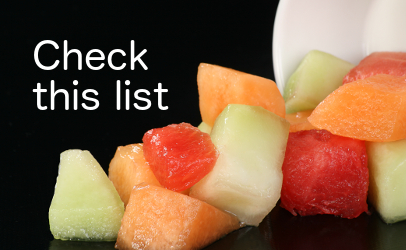
The USDA's Food Safety Inspection Service routinely gathers and posts lists of specific locations where recalled products have been sold, but the FDA has consistently said it cannot release such details, saying they constitute “confidential corporate information” that is protected by federal law.
Specific stores that sold the pre-cut melon are listed here. Many of the pages in the document are mostly blank, so be sure to keep scrolling down to see the entire list.
The FDA is advising consumers to discard any recalled products purchased at the listed locations. It is possible that some stores may be mentioned on the retailer list more than once because they received more than one shipment or more than one product. Consumers may wish to ask a firm directly if the recalled product was available for sale.
Following are the most recent outbreak and recall details posted by the FDA and the Centers for Disease Control and Prevention.
FDA advises consumers not to eat recalled fresh cut watermelon, honeydew melon, cantaloupe, and fresh-cut fruit medley products containing any of these melons produced at the Caito Foods facility in Indianapolis, Indiana. Products produced at this facility have been distributed in Georgia, Illinois, Indiana, Iowa, Kentucky, Michigan, Missouri, North Carolina, Ohio, Pennsylvania, West Virginia, and Wisconsin. The products were packaged in clear, plastic clamshell containers and distributed to Costco, Jay C, Kroger, Payless, Owen's, Sprouts, Trader Joe's, Walgreens, Walmart, and Whole Foods/Amazon. Caito Foods, LLC has voluntarily recalled fruit salad mixes that contain pre-cut melons to prevent further distribution of potentially contaminated products.
The CDC reports that 60 people in five Midwestern states have become ill. Among 47 people with information available, thirty-one cases (66%) have been hospitalized.
The 60 illnesses occurred within the period of April 30 to May 28.
The FDA is working with CDC, along with state partners in Illinois, Indiana, Michigan, Missouri, Iowa, and Ohio to trace back the pre-cut melons to identify the source to determine the full distribution of pre-cut melons, and to learn more about the potential route of contamination.
Consumers who have symptoms of Salmonella — especially if they have recently eaten pre-cut melon — infection should contact their health care provider to report their symptoms and receive care. Most people infected with Salmonella develop diarrhea, fever, and abdominal cramps. Most infections usually lasts 4 to 7 days and most people recover without treatment, however some people develop diarrhea so severe that they need to be hospitalized. High-risk groups include young children, adults older than 65, and pregnant women.







